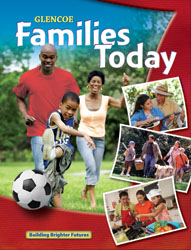
Families TodayChapter 15: Relate to Older AdultsChapter Summaries with Key Terms and Academic VocabularyChapter SummarySection 15.1 Concerns of Older Adults Older adults have a variety of concerns as they age. They may have financial and health concerns. They may also reach a point where they cannot live alone. They may share a house, live in a group home, move in with an adult child, or live in a retirement community. Nursing homes may be used for those who need skilled care. Older adults are concerned about safety from crime. Elder abuse and neglect can also be problems of aging. Older adults are individuals and should not be stereotyped. They are working to solve the problems they face. Section 15.2 The Aging Process Gerontology is the study of the aging process. There are five general stages of life for older adults. The final years of life are sometimes called the third age. During this time, people face many changes. Physical changes are the most obvious. These can be slowed by good health, nutrition, and exercise. There are also mental, social, and emotional changes. Older adults who stay involved can maintain their mental skills. The biggest social change is retirement. Many adults enjoy the role of grandparent. Preserving emotional health is vital for older adults. Content and Academic Vocabulary
Academic Vocabulary frugal frail reminisce vibrant |  |















